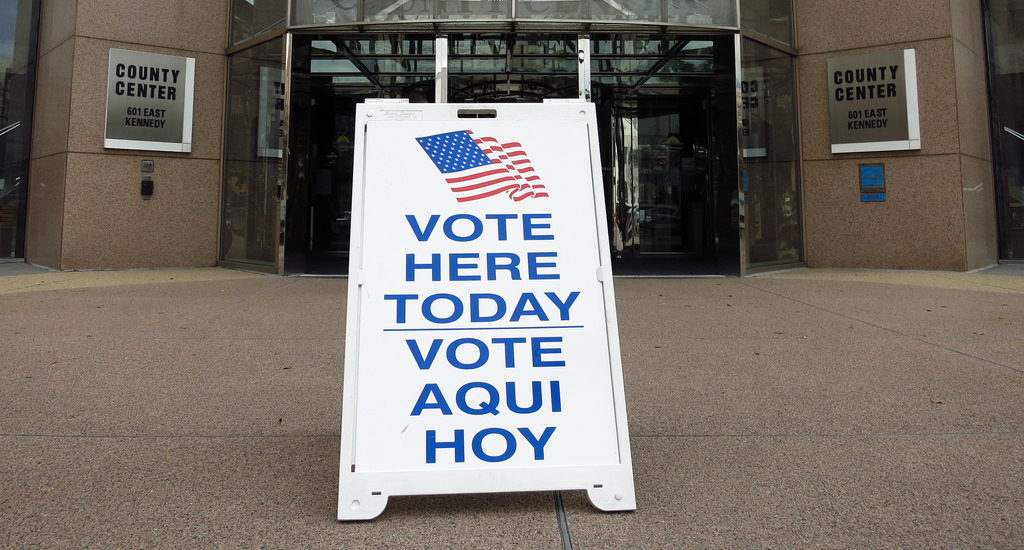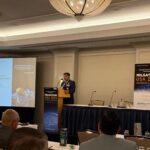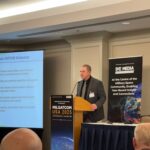On Thursday, President Donald Trump issued an executive order to create a new commission to investigate his claims of widespread voter fraud, reigniting the storm of skepticism that has surrounded his past allegations of election interference and rigging.
Even after securing his electoral college victory and winning the presidency, Donald Trump would not let go of his claims that millions of Americans had voted illegally. That margin, he said, effectively robbed him of the popular vote, which Hillary Clinton won by almost 3 million votes.
Days after being sworn in as president, Trump reportedly complained to lawmakers that between 3 to 5 million people voted illegally in the 2016 election. According to Trump, millions of illegal immigrants, dead people and otherwise ineligible voters were on the rolls. Shortly after taking office, he vowed to get to the bottom of the fraud and appoint Vice President Pence to head the effort.
According to the executive order, the Presidential Commission on Election Integrity aims to “enhance the American people’s confidence in the integrity of the voting processes” by reviewing the policies, laws, and vulnerabilities that undermine public confidence and could lead to “fraudulent voter registrations and fraudulent voting.”
Polls taken right ahead of the election showed the majority of Americans had a high degree of confidence in the integrity of the election. That degree of confidence dropped significantly when Trump supporters were asked, with more than half indicating their distrust in the integrity of the vote count.
Fact-checkers, state election authorities and lawmakers from both political parties have largely dismissed Trump’s claims that of election fraud since November 8. Immediately after the announcement of the new commission, some suggested that the administration will be using taxpayer resources to solve a problem that doesn’t really exist. Other critics suspect even more nefarious motives, suggesting that the panel’s leadership and its mission may actually be an effort to justify stricter voting laws that could suppress the vote.
But the White House, its supporters and some researchers have pointed to evidence of potential abuse that they say warrants review by the commission.
As promised, Vice President Pence will lead the commission and he will be joined by Kansas’ Republican Secretary of State Kris Kobach who will serve as the co-chair. Both men have supported Trump’s claims of widespread voter fraud, but Kobach was a particularly controversial choice. Earlier this year, Kobach estimated that as many as 3 million people are registered in multiple states and in states with large illegal immigrant populations, like California and Texas, “you could have more than a million votes that were not legitimate.”
Kobach is also taking heat from voting rights groups for his long-time advocacy of stricter voter registration and voter ID laws. The American Civil Liberties Union (ACLU) attacked Kobach as “the king of voter suppression.” The group cited a unanimous court ruling in 2016 that found Kobach, as Kansas Secretary of State, tried to deny voter registration to 18,000 individuals, based on the state’s voter ID laws.
The White House is working to fill as many as 15 positions on the bipartisan commission. Two Republicans have been named, former Ohio Secretary of State Ken Blackwell and Indiana Secretary of State Connie Lawson, and two Democrats have been recommended, New Hampshire Secretary of State Bill Gardner and Maine Secretary of State Matthew Dunlap.
Dunlap spoke to local press on Thursday, expressing deep skepticism of Trump’s voter fraud claims that he will likely soon be investigating.
“I think the outcome of the commission’s work, without prejudging it, is that they are probably not going to find a hell of a lot,” Dunlap told the Portland Press Herald. Dunlap indicated he is open to serving on the president’s commission, because as a member, “I’m in a better posture to debunk it than I would be if I refused to serve and said I’m not going to be affiliated with anything in the Trump administration.”
Democratic lawmakers also took issue with Trump’s latest executive order. Senate Minority Leader Chuck Schumer denounced the panel, saying Trump “has decided to waste taxpayer dollars chasing a unicorn and perpetuating the dangerous myth that widespread voter fraud exists.”
Civil rights activist Rep. John Lewis (D-Ga.) issued a statement saying the administration put the legacy of the Voting Rights Act “under attack” calling the commission “nothing more than a cover for them to threaten our progress with … rules that obstruct an inclusive democracy.”
POLL: Do you feel large-scale voter fraud is a problem in the U.S.?
For Tom Fitton, the president of Judicial Watch, a conservative government watchdog group, declared his support for the Trump panel months ago, saying the time for a non-partisan federal investigation into voter fraud is “long overdue.”
Back in February, he crunched the numbers estimating the potential for massive voter fraud. One study that found more than 6 percent of foreign nationals living in the United States voted in the 2008 presidential election. Applying the same statistics to 2016, Fitton concluded that “1.41 million aliens may have voted illegally, with probably 1.13 million voting for Democrats.”
On top of non-citizens casting ballots, Fitton also points to a 2012 Pew Research study that found approximately 2.75 million people have active registrations in more than one state and 1.8 million deceased individuals were listed as active voters.
California Senator Diane Feinstein, ranking member on the Judiciary Committee rejected any claims of widespread voter fraud and called the creation of the commission “absurd.”
“This is a transparent attempt to justify President Trump’s false claim that millions of people voted illegally in the 2016 presidential election,” she said. “There’s simply no evidence of widespread voter fraud in this country. Period.”
California is one of the states Trump and his supporters have pointed to as a hotbed of voter fraud. It is also a state Hillary Clinton won with a margin of 4.3 million votes.
In 2014, California updated its voter registration law to allow any individual obtaining a driver’s license to also register to vote without proving his or her citizenship. California is one of the states that allows undocumented immigrants to obtain a license. According to reports, between the time the law was updated and November 2016, it has been reported that 80,000 people obtained a driver’s license.
Michael Barone, an elections policy analyst with the American Enterprise Institute, argued that California’s “motor-voter” law is “obviously a sieve with some pretty wide openings for people who are not eligible to vote to get into the voter pool.”
But drilling down to get the exact number of ineligible voters, even in that one state is difficult, let alone determining the impact of improper voting on election outcomes.
“Is it possible there are 100,000 or 200,000 that are not eligible to vote? Yeah. Would it have changed the outcome of the presidential race or most election races int he state of California? No it would not have,” Barone said. But in close local elections, the numbers could certainly have an impact.
Those numbers still only provide circumstantial evidence and highlight the potential for abuse of the vote. After the dust had settled post-November 8, there were documented cases of voter fraud, but those numbered in the dozens.
Officials overseeing statewide elections and carefully monitoring polling places for hacking and other irregularities, reported back one after the other that they simply had not found evidence of widespread voter fraud. The National Association of Secretaries of State issued a statement in January stating they could not point to any evidence supporting the voter fraud claims made by President Trump.
Robert Bauer is a career attorney and served as the co-chair of Barack Obama’s Presidential Commission on Election Administration. He argued that the public positions taken by the Trump administration on alleged voter fraud, make the entire premise of the commission is suspect.
“A virtual cottage industry of voter fraud alarmism has sprung up to shake public confidence in the voting systems,” Bauer argued. “The Commission is an escalation in the campaign to persuade the American public that their voting systems are failing. It is not intended to bolster confidence, but to undermine it.”
While the text of the executive order says the commission will focus on enhancing public confidence, Bauer warned it will “create or compound a problem of confidence that it will then announce it must solve.”
Some election and voter registration experts see the focus of the commission is a solution in need of a problem.
Ahead of the 2016 election, the Department of Homeland Security sounded the alarm, warning of various attempted breaches of electronic voter registration systems, two of which were successful in Illinois and Arizona. There are also dozens of states that rely on electronic ballots and electronic voter registration, all of which can create real vulnerabilities in terms of both voter suppression, purging voter rolls, and potentially even fraud.
Pamela Smith is the president of Verified Voting, an advocacy group that works on the intersection of technology, security and ensuring each vote is counted. Smith noted that the new Trump commission “does not appear to be charged with identifying ways in which our voting systems and technology can be made more resilient to tampering and malfunction.”
Guaranteeing that every vote can be counted and audited and that the voting and registration process occurs without tampering or errors is a problem that still needs to be solved, Smith said.
“If you take the word of the election officials out there working in states and in the counties where elections are run,” she noted, “there is a preponderance of them who say what this commission seems to be charged with is a non-problem.”






